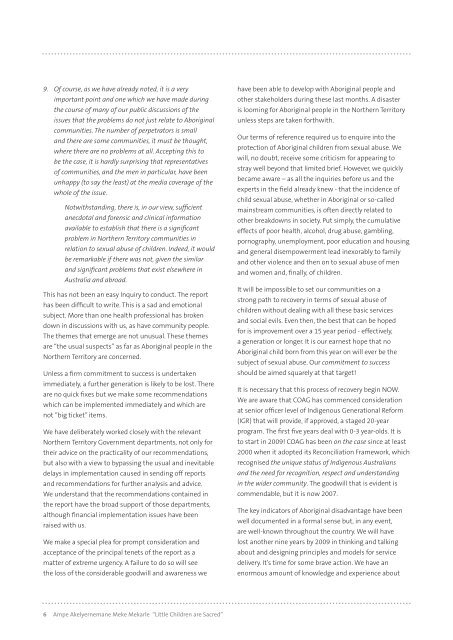bipacsa_final_report
bipacsa_final_report
bipacsa_final_report
Create successful ePaper yourself
Turn your PDF publications into a flip-book with our unique Google optimized e-Paper software.
9. Of course, as we have already noted, it is a very<br />
important point and one which we have made during<br />
the course of many of our public discussions of the<br />
issues that the problems do not just relate to Aboriginal<br />
communities. The number of perpetrators is small<br />
and there are some communities, it must be thought,<br />
where there are no problems at all. Accepting this to<br />
be the case, it is hardly surprising that representatives<br />
of communities, and the men in particular, have been<br />
unhappy (to say the least) at the media coverage of the<br />
whole of the issue.<br />
Notwithstanding, there is, in our view, sufficient<br />
anecdotal and forensic and clinical information<br />
available to establish that there is a significant<br />
problem in Northern Territory communities in<br />
relation to sexual abuse of children. Indeed, it would<br />
be remarkable if there was not, given the similar<br />
and significant problems that exist elsewhere in<br />
Australia and abroad.<br />
This has not been an easy Inquiry to conduct. The <strong>report</strong><br />
has been difficult to write. This is a sad and emotional<br />
subject. More than one health professional has broken<br />
down in discussions with us, as have community people.<br />
The themes that emerge are not unusual. These themes<br />
are “the usual suspects” as far as Aboriginal people in the<br />
Northern Territory are concerned.<br />
Unless a firm commitment to success is undertaken<br />
immediately, a further generation is likely to be lost. There<br />
are no quick fixes but we make some recommendations<br />
which can be implemented immediately and which are<br />
not “big ticket” items.<br />
We have deliberately worked closely with the relevant<br />
Northern Territory Government departments, not only for<br />
their advice on the practicality of our recommendations,<br />
but also with a view to bypassing the usual and inevitable<br />
delays in implementation caused in sending off <strong>report</strong>s<br />
and recommendations for further analysis and advice.<br />
We understand that the recommendations contained in<br />
the <strong>report</strong> have the broad support of those departments,<br />
although financial implementation issues have been<br />
raised with us.<br />
We make a special plea for prompt consideration and<br />
acceptance of the principal tenets of the <strong>report</strong> as a<br />
matter of extreme urgency. A failure to do so will see<br />
the loss of the considerable goodwill and awareness we<br />
Ampe Akelyernemane Meke Mekarle “Little Children are Sacred”<br />
have been able to develop with Aboriginal people and<br />
other stakeholders during these last months. A disaster<br />
is looming for Aboriginal people in the Northern Territory<br />
unless steps are taken forthwith.<br />
Our terms of reference required us to enquire into the<br />
protection of Aboriginal children from sexual abuse. We<br />
will, no doubt, receive some criticism for appearing to<br />
stray well beyond that limited brief. However, we quickly<br />
became aware – as all the inquiries before us and the<br />
experts in the field already knew - that the incidence of<br />
child sexual abuse, whether in Aboriginal or so-called<br />
mainstream communities, is often directly related to<br />
other breakdowns in society. Put simply, the cumulative<br />
effects of poor health, alcohol, drug abuse, gambling,<br />
pornography, unemployment, poor education and housing<br />
and general disempowerment lead inexorably to family<br />
and other violence and then on to sexual abuse of men<br />
and women and, <strong>final</strong>ly, of children.<br />
It will be impossible to set our communities on a<br />
strong path to recovery in terms of sexual abuse of<br />
children without dealing with all these basic services<br />
and social evils. Even then, the best that can be hoped<br />
for is improvement over a 15 year period - effectively,<br />
a generation or longer. It is our earnest hope that no<br />
Aboriginal child born from this year on will ever be the<br />
subject of sexual abuse. Our commitment to success<br />
should be aimed squarely at that target!<br />
It is necessary that this process of recovery begin NOW.<br />
We are aware that COAG has commenced consideration<br />
at senior officer level of Indigenous Generational Reform<br />
(IGR) that will provide, if approved, a staged 20-year<br />
program. The first five years deal with 0-3 year-olds. It is<br />
to start in 2009! COAG has been on the case since at least<br />
2000 when it adopted its Reconciliation Framework, which<br />
recognised the unique status of Indigenous Australians<br />
and the need for recognition, respect and understanding<br />
in the wider community. The goodwill that is evident is<br />
commendable, but it is now 2007.<br />
The key indicators of Aboriginal disadvantage have been<br />
well documented in a formal sense but, in any event,<br />
are well-known throughout the country. We will have<br />
lost another nine years by 2009 in thinking and talking<br />
about and designing principles and models for service<br />
delivery. It’s time for some brave action. We have an<br />
enormous amount of knowledge and experience about


